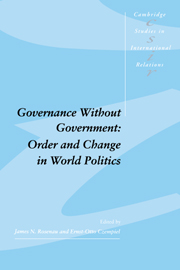Book contents
- Frontmatter
- Contents
- Notes on contributors
- Preface
- 1 Governance, order, and change in world politics
- 2 Governance without government: polyarchy in nineteenth-century European international politics
- 3 The decaying pillars of the Westphalian temple: implications for international order and governance
- 4 The “triumph” of neoclassical economics in the developing world: policy convergence and bases of governance in the international economic order
- 5 Towards a post-hegemonic conceptualization of v/orld order: reflections on the relevancy of Ibn Khaldun
- 6 The effectiveness of international institutions: hard cases and critical variables
- 7 Explaining the regulation of transnational practices: a state-building approach
- 8 “And still it moves!” State interests and social forces in the European Community
- 9 Governance and democratization
- 10 Citizenship in a changing global order
- Index
3 - The decaying pillars of the Westphalian temple: implications for international order and governance
Published online by Cambridge University Press: 13 October 2009
- Frontmatter
- Contents
- Notes on contributors
- Preface
- 1 Governance, order, and change in world politics
- 2 Governance without government: polyarchy in nineteenth-century European international politics
- 3 The decaying pillars of the Westphalian temple: implications for international order and governance
- 4 The “triumph” of neoclassical economics in the developing world: policy convergence and bases of governance in the international economic order
- 5 Towards a post-hegemonic conceptualization of v/orld order: reflections on the relevancy of Ibn Khaldun
- 6 The effectiveness of international institutions: hard cases and critical variables
- 7 Explaining the regulation of transnational practices: a state-building approach
- 8 “And still it moves!” State interests and social forces in the European Community
- 9 Governance and democratization
- 10 Citizenship in a changing global order
- Index
Summary
Everything in the world has changed except our thinking.
Albert EinsteinWe playwrights who have to cram a whole human life or an entire historical era into a two-hour play, can scarcely understand this rapidity [of change] ourselves. And if it gives us trouble, think of the trouble it must give political scientists who have less experience with the realm of the improbable.
President Vaclav Havel of Czechoslovakia, Address to U.S. Congress, February 1990International relations scholars are one of the most conservative groups of social scientists in the world in the sense that we are very skeptical, if not cynical, about the possibility of fundamental change in the parameters of our area of study. In fact, we generally believe that illusions concerning the possibility of major change can wreak greater havoc in the world than a realistic acceptance of the rather nasty nature of international politics. The basic reality that we feel we must accept is a system of states that are subject to minimal international governance and that go to war regularly to realize various goals. In the present era our long-held and justifiable cynicism concerning the possibility for change in the traditional interstate system could blind us to a significant transformation in global politics.
Increasingly, academic experts and policy-makers are observing explicitly or implicitly that the international system might be in the midst of some fundamental political changes.
- Type
- Chapter
- Information
- Governance without GovernmentOrder and Change in World Politics, pp. 58 - 101Publisher: Cambridge University PressPrint publication year: 1992
- 56
- Cited by

